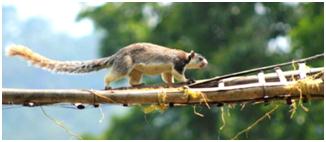Building bridges in the forest, to help wildlife
- Posted By
10Pointer
- Categories
Environment
- Published
9th Dec, 2020
-
- Eco-ducts or eco-bridges aim to enhance wildlife connectivity that can be disrupted because of highways or logging.
- These include canopy bridges for monkeys, squirrels and other arboreal species;
What are eco-bridges?
- Eco-ducts or eco-bridges aim to enhance wildlife connectivity that can be disrupted because of highways or logging.
- These include canopy bridges for monkeys, squirrels and other arboreal species; concrete underpasses or overpass tunnels or viaducts for larger animals; and amphibian tunnels or culverts.
What are the living examples of these bridges?
- NH 44, which intersects Kanha-Pench and Pench-Navegaon-Nagzira corridors in various sections. It’s one of India’s success stories. It is used by nearly 18 species that used these underpasses, including tiger, leopard, and golden jackal.
- One of the largest underpasses – 1.4km – for animal conservation is India is being built along the Madhya Pradesh-Maharashtra border.
- Other proposals include the Chennai-Bangalore National Highway, in the Hosur-Krishnagiri segment, near reserve forests for elephant crossings, and in the Tadoba-Andhari Tiger Reserve in Chandrapur, Maharashtra.
Why eco-bridges matter?
- They enhance wildlife connectivity that can be disrupted because of highways or logging.
- They help in connection of forest and wildlife conservation.



